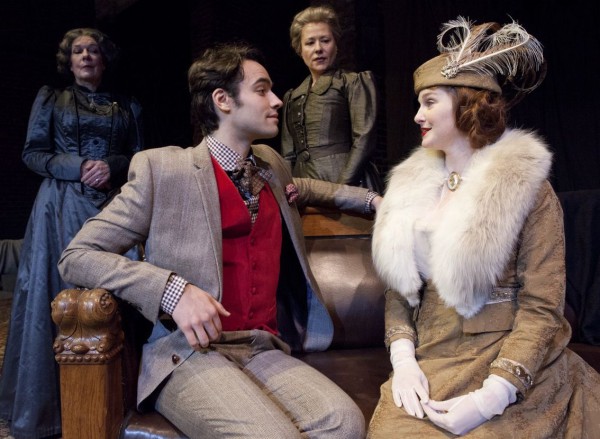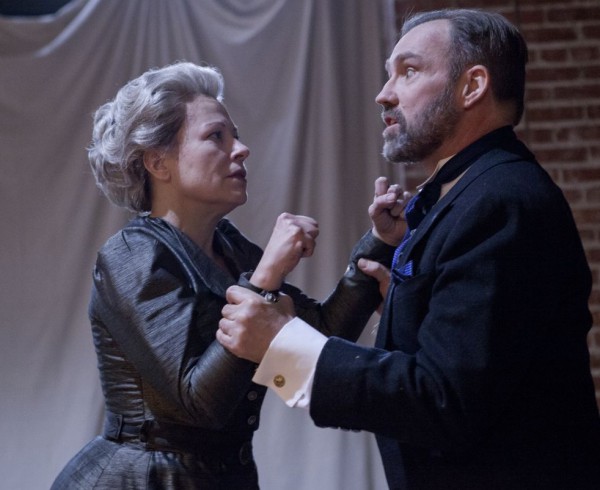Quantum Theater Presents Ibsen’s John Gabriel Borkman
- Like
- Digg
- Del
- Tumblr
- VKontakte
- Buffer
- Love This
- Odnoklassniki
- Meneame
- Blogger
- Amazon
- Yahoo Mail
- Gmail
- AOL
- Newsvine
- HackerNews
- Evernote
- MySpace
- Mail.ru
- Viadeo
- Line
- Comments
- Yummly
- SMS
- Viber
- Telegram
- Subscribe
- Skype
- Facebook Messenger
- Kakao
- LiveJournal
- Yammer
- Edgar
- Fintel
- Mix
- Instapaper
- Copy Link

Quantum Theatre’s cast play out a scene from Ibsen’s John Gabriel Borkman. L to r: Bridget Connors (Gunhild Borkman) , Luka Glinsky (Erhart Borkman), Robin Walsh (Ella Rentheim) and Daina Michelle Griffith. (Fanny Walton).
If you’re looking for colorful costumes or a dazzling set to lift the winter blues, you won’t find it in Quantum Theater’s production of John Gabriel Borkman, playing now through Feb. 24 at the Hart Building in East Liberty. Yet, strangely, it is the production’s sparse but thoughtful use of color that piqued my interest at the opening night performance of Norwegian playwright Henrik Ibsen’s lesser-known drama.
Set in the living room of the deteriorating Rentheim family mansion outside of Oslo at the dawn of the Industrial Age, the play opens eight years after John Gabriel’s (Malcolm Tulip) release from prison for embezzling money from the bank he managed. Clad in the grays and blacks suited for a man of his stature in late 19th-century Norway, John Gabriel is pacing the floors of his new “prison,” the once Grand Ballroom on the second floor of the estate where he now lives. Below sits his estranged and embittered wife, Gunhild (Bridget Connors), who stews over her long-ago losses and waits anxiously for a nightly visit from her son, Erhart (Luka Glinsky), a university student on whom she places her hopes for redeeming the ruined Borkman name.
When a visitor arrives, it is not her beloved Erhart, but Ella Rentheim, the twin sister who once loved John Gabriel, before he threw her over in his relentless pursuit to control the “waterfalls, quarries, trade routes and shipping lines over the whole wide world!”

Robin Walsh (Ella Rentheim) and Malcolm Tulip (John Gabriel Borkman) in an intense scene.
Gunhild hasn’t talked to Ella since her husband’s trial more than a dozen years earlier. Gunhild’s steel-gray dress, like the furnishings of their home, are worn and dated, only a slight contrast to her sister’s lighter gray, more fashionable garb. No matter the shade, everything about these three characters is woven with threads of gray.
The ailing and aging spinster Ella (Robin Walsh), the Borkmans’ benefactress after the family’s downfall, is there in hopes of bringing Erhart back to live in her home on the coast of Norway, where she cared for him subsequent to the family tragedy.
When Erhart finally enters the scene, mother and aunt are deep in a tussle over control of his future. His entrance brings the first spark of color to the family home, a brilliant red vest beneath his fashionably modern suit coat, complementing the open, hopeful Erhart. It doesn’t take long for him to understand from his aunt and mother’s conversation that he is being sucked into the vortex of his family’s downward spiral. But Erhart has dreams of his own, and they don’t include redeeming his elderly family members’ broken lives.
His idea of redemption is in the form of the comely divorcee Fanny Wilton (Daina Michelle Griffith), who makes two appearances on stage during the four-act play. In the first, the coquettish older woman (she’s seven years Erhart’s senior) is wearing a proper but stylish beige suit. After a brief visit, Fanny and Erhart take their leave of the quarrelsome sisters and embark on an evening of dancing at a neighbor’s home. Fanny’s second appearance is at the end of Act III. This time she’s wrapped in, if you haven’t guessed, a temptuous red shawl. By now it’s hard to miss Ibsen’s in-your-face symbolism.
Brilliant, too, is the production’s portrayal of Frida Foldal’s (Carly Otte) violin performance at the opening of Act II. She’s come often to play music for John Gabriel, who hasn’t left the manse since his release from prison. As we listen to the recorded, mournful strands of “Danse Macabre,” Frida—wrapped in a crimson red cape—seems to step out of this 19th-century drama and offer the audience a sublime, contemporary dance.
The color red permeates the play, and while the younger set is draped in bold hues, there are duller reds wherever the elders tread: on the faded warn carpet that lines the living room or the dull burgundy leather couch where Gunhild slumps for much of the play. Even when John Gabriel’s only friend, the bent and aging Vilhelm Foldal (Ken Bolden) comes to visit, he is carrying with him his unpublished manuscript, a tragedy, in a worn red briefcase.
In keeping with Ibsen’s better known plays (A Doll’s House, 1879, and Hedda Gabler, 1891) John Gabriel Borkman (1896) evokes the gloom that is often part of Scandinavian literature. But under Martin Giles direction, the Borkman characters cull a surprising amount of humor from their lines. Audience laughter sporadically peppered the dialogue, even at humorously challenged moments. When John Gabriel and Vilhelm come to the conclusion that after all the years of meeting in the Grand Ballroom, what they thought was friendship was fraught with delusion and petty fraud.
Vilhelm: They weren’t lies…as long as you believe in me, so long I believed in you.
Borkman: Then we’ve been deluding each other mutually. And deluding ourselves – both of us.
Vilhelm: But isn’t that at bottom of what friendship is, John Gabriel?
Borkman: Yes, to delude—that’s friendship. You’re right there.
Performed within a partially renovated, century-old East Liberty storefront, Quantum’s production of John Gabriel Borkman is worth stepping out into the Pittsburgh cold to see. Written over 110 years ago, Ibsen’s story line and themes of unrestrained greed and fiscal fraud at the expense of others could seamlessly be extracted and performed on the contemporary stage in society’s current financial milieu. There are still lessons to be learned.
Photo’s Courtesy of Quantum Theatre and Heather Mull
Share on Social Media
- Like
- Digg
- Del
- Tumblr
- VKontakte
- Buffer
- Love This
- Odnoklassniki
- Meneame
- Blogger
- Amazon
- Yahoo Mail
- Gmail
- AOL
- Newsvine
- HackerNews
- Evernote
- MySpace
- Mail.ru
- Viadeo
- Line
- Comments
- Yummly
- SMS
- Viber
- Telegram
- Subscribe
- Skype
- Facebook Messenger
- Kakao
- LiveJournal
- Yammer
- Edgar
- Fintel
- Mix
- Instapaper
- Copy Link
Follow Entertainment Central
Sign up for the EC Newsletter
Latest Stories







